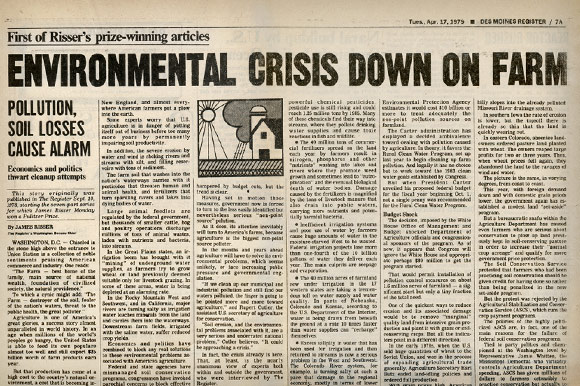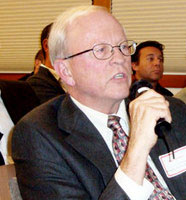
The Bill Lane Center for the American West, Stanford University

James V. Risser, Pioneer of Environmental Journalism
By James R. Bettinger
Director, John S. Knight Journalism Fellowships
The values that are embodied in the Knight-Risser Prize for Western Environmental Journalism are exemplified in James V. Risser’s career as a two-time Pulitzer Prize-winning journalist.
Risser was a singularly outstanding figure in 20th century journalism. He distinguished himself as an investigative reporter, as an environmental reporter, and as a leader in the efforts to improve the quality of modern journalism.
Risser was a tenacious and meticulous investigative reporter at the Des Moines Register when a bland Department of Agriculture press release about the suspension of five grain inspectors in Houston, Texas, caught his attention in 1975. Risser dug in and produced a yearlong series of stories about widespread conflict-of-interest and corruption in agencies that were supposedly inspecting U.S. grain shipments abroad. The series won the Pulitzer Prize for National Reporting in 1976.
Risser also specialized in stories that provided a sweeping, comprehensive picture of major problems and challenges. Two years after his series on corrupt grain inspectors won the Pulitzer, he wrote a series of articles explaining how modern American farming practices were damaging the environment through severe soil erosion, depletion of water supplies, and contamination by agricultural chemicals. This erosion contributed to the twin evils of lost farmland fertility and polluted water. His six-month examination revealed that agricultural topsoil was being lost at a pace twice as fast as the topsoil could replace itself. This series won the Pulitzer Prize for National Reporting in 1979.
Risser worked for the Des Moines Register for 20 years, first in Iowa and then in Washington, D.C., as bureau chief. He was appointed director of the John S. Knight Journalism Fellowships program at Stanford University in 1985. It was a homecoming of sorts. Risser grew up in Nebraska, earned a law degree at the University of San Francisco, and always considered himself a man of the West. He has lived in California and Oregon ever since. One of his early efforts as director of the Knight Fellowships was to establish an annual meeting between the fellows and western author Wallace Stegner.
In his post-Des Moines Register career, Risser became a leader in efforts to improve journalism. He was a member of the Pulitzer Board for nine years and its co-chair for one year. He was on the steering committee of the Committee of Concerned Journalists and on the editorial advisory board of the Reuters Foundation in London. But perhaps his most important legacy in this regard is the 283 journalists who were Knight Fellows during the 15 years that he was director of the Knight Fellowships. They include Pulitzer Prize winners, journalism school deans, major newspaper editors, and accomplished writers, producers, and editors in all media.
So it was entirely appropriate that a group of Knight Fellowships alumni first proposed that a journalism prize for Western environmental reporting be established in his name. Fittingly, the prize places a premium on stories that expose undiscovered or covered-up problems, explain complex detailed solutions in ways that can be put to use, and help readers understand the broader significance of the issues being covered, beyond the immediate, important details of the stories at hand.
The stories honored by the Knight-Risser Prize are a fitting testimony to Risser’s legacy and vision.

“Risser was a singularly outstanding figure in 20th century journalism. He distinguished himself as an investigative reporter, as an environmental reporter and as a leader in the efforts to improve the quality of modern journalism.”
Texas Tribune, ProPublica

The Desert Sun and USA Today

CPI, InsideClimate News, The Weather Channel

The Seattle Times

The Sacramento Bee

High Country News

5280 Magazine

Seattle Post-Intelligencer

What Went Wrong?
The Seattle Times

San Antonio Express-News

The Los Angeles Times

High Country News



